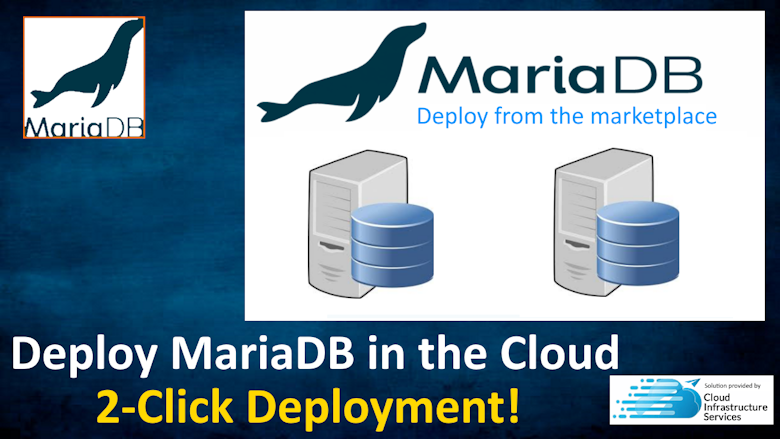
Overview

MariaDB
MariaDB® Server on Ubuntu 24.04
This is a repackaged open source software product wherein additional charges apply for support & maintenance.
MariaDB Server is one of the most popular database servers in the world, optimized for AWS cloud deployment. It's made by the original developers of MySQL and guaranteed to stay open source. Notable users include Wikipedia, WordPress.com, and Google, many of whom run MariaDB on AWS infrastructure.
MariaDB turns data into structured information in a wide array of applications, ranging from banking to websites, all scalable on AWS. Originally designed as enhanced, drop-in replacement for MySQL, MariaDB is used because it is fast, scalable and robust, with a rich ecosystem of storage engines, plugins and many other tools make it very versatile for a wide variety of use cases on AWS EC2 instances.
MariaDB is developed as open source software and as a relational database it provides an SQL interface for accessing data. The latest versions of MariaDB also include GIS and JSON features, perfect for modern AWS applications.
MariaDB Server Features
Core Database Features
- Multiple Storage Engines: Wide selection of storage engines, including high-performance storage engines, for working with other RDBMS data sources on AWS
- Standard SQL Interface: Uses a standard and popular querying language compatible with AWS applications
- ColumnStore Engine: Storage engine optimized for data warehousing workloads on AWS
- Cross-Platform Support: Runs on multiple operating systems and supports a wide variety of programming languages on AWS EC2
- PHP Integration: Native support for PHP, one of the most popular web development languages for AWS applications
- MySQL Compatibility: Full compatibility with MySQL client command line tools and applications
Advanced Features
- Galera Cluster Technology: Multi-master replication for high availability across AWS availability zones
- Enhanced Performance: Many operations and commands unavailable in MySQL, eliminating features that impact performance negatively
- Pluggable Authentication: Flexible authentication mechanisms compatible with AWS IAM integration
- GIS Functionality: Built-in geographic information system capabilities for location-based AWS applications
- Progress Reporting: Real-time progress reporting for long-running operations
- Multi-Source Replication: Advanced replication capabilities for complex AWS deployment scenarios
AWS Integration Features
- EC2 Optimization: Optimized for AWS EC2 instances with enhanced networking and storage performance
- EBS Integration: Native support for AWS Elastic Block Store for high-performance storage
- VPC Security: Full integration with AWS VPC security groups and network ACLs
- CloudWatch Monitoring: Integration with AWS CloudWatch for performance monitoring and alerting
- Auto Scaling: Compatible with AWS Auto Scaling for dynamic resource management
- Multi-AZ Deployment: Support for deployment across multiple AWS availability zones for high availability
- Backup Integration: Works with AWS Backup services and S3 for automated database backups
- RDS Migration Path: Clear migration path to Amazon RDS for MariaDB when fully managed services are needed
Enterprise Features
- High Availability: Galera cluster support for active-active replication across AWS regions
- Load Balancing: Integration with AWS Application Load Balancer for database connection management
- Security: Enhanced security features compatible with AWS security best practices
- Monitoring: Comprehensive monitoring capabilities with AWS CloudWatch integration
- Disaster Recovery: Cross-region replication capabilities for AWS disaster recovery scenarios
AWS Deployment Benefits
MariaDB on AWS provides enterprise-grade database hosting with the scalability, reliability, and security of AWS infrastructure. Deploy across multiple availability zones for high availability, integrate with AWS managed services for monitoring and backups, and leverage the comprehensive AWS ecosystem for enhanced functionality.
The combination of MariaDB's advanced features and AWS's robust infrastructure makes it an ideal choice for organizations requiring high-performance, scalable database solutions in the cloud.
Disclaimer: MariaDB® is a registered trademark owned by MariaDB Corporation Ab, Inc and is licensed under GPL v2 license. No warranty of any kind, express or implied, is included with this software. Use at your risk, responsibility for damages (if any) to anyone resulting from the use of this software rest entirely with the user. The author is not responsible for any damage that its use could cause.
Highlights
- MariaDB turns data into structured information in a wide array of applications, ranging from banking to websites. Originally designed as enhanced, drop-in replacement for MySQL, MariaDB is used because it is fast, scalable and robust, with a rich ecosystem of storage engines, plugins and many other tools make it very versatile for a wide variety of use cases.
- Run production databases at scale, optimised for performance
- MariaDB® Server is is fast, scalable and robust, with a rich ecosystem of storage engines
Details
Introducing multi-product solutions
You can now purchase comprehensive solutions tailored to use cases and industries.

Features and programs
Financing for AWS Marketplace purchases

Pricing
- ...
Dimension | Cost/hour |
|---|---|
t2.medium Recommended | $0.05 |
t3.micro | $0.05 |
t2.micro | $0.05 |
m4.10xlarge | $0.05 |
t3a.2xlarge | $0.05 |
c5n.large | $0.05 |
m5d.8xlarge | $0.05 |
m5d.large | $0.05 |
r4.2xlarge | $0.05 |
m5.xlarge | $0.05 |
Vendor refund policy
We do not currently support refunds, but you can cancel at any time.
How can we make this page better?

Legal
Vendor terms and conditions
Content disclaimer
Delivery details
64-bit (x86) Amazon Machine Image (AMI)
Amazon Machine Image (AMI)
An AMI is a virtual image that provides the information required to launch an instance. Amazon EC2 (Elastic Compute Cloud) instances are virtual servers on which you can run your applications and workloads, offering varying combinations of CPU, memory, storage, and networking resources. You can launch as many instances from as many different AMIs as you need.
Version release notes
Latest OS patches have been installed. Simply run 'sudo apt-get update' to install the latest OS patches.
Additional details
Usage instructions
Scroll down to 'Getting Started' on the following URL: https://cloudinfrastructureservices.co.uk/how-to-setup-mariadb-on-linux-in-azure-aws-gcp/
Resources
Vendor resources
Support
Vendor support
Email support, contact us through our website or leave a comment on our getting started guide
AWS infrastructure support
AWS Support is a one-on-one, fast-response support channel that is staffed 24x7x365 with experienced and technical support engineers. The service helps customers of all sizes and technical abilities to successfully utilize the products and features provided by Amazon Web Services.
Similar products




Customer reviews
MariaDB on Ubuntu is the best combination to run production grade Database clusters
Easy setup and configuration make it a go-to system for relational DB.
Having multiple DB engines (InnoDB, Aria, RocksDB) is very helpful in a single cluster and is able to tune according to the business requirements (read heavy vs write heavy).
No full-fledged native incremental backup support.
Having multiple DB engines in a single cluster helps in reducing the cost of deploying multiple clusters.